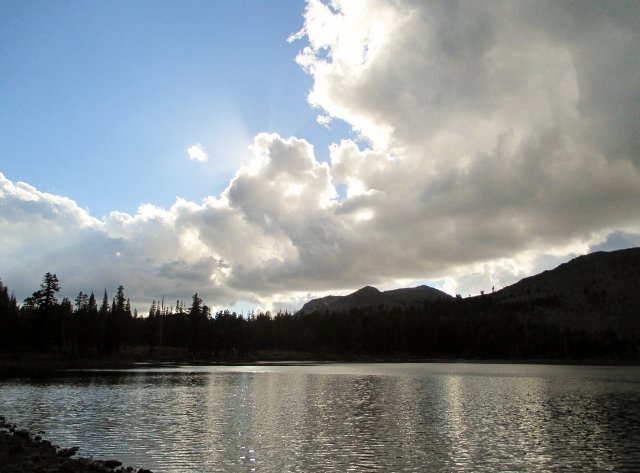Topic
Why Your (BPL) Nature Shot Is Breaking the Law
Forum Posting
A Membership is required to post in the forums. Login or become a member to post in the member forums!
Home › Forums › Campfire › On the Web › Why Your (BPL) Nature Shot Is Breaking the Law
- This topic has 5 replies, 5 voices, and was last updated 8 years, 10 months ago by
 Ian.
Ian.
-
AuthorPosts
-
Feb 18, 2016 at 11:47 pm #3383031
Posting the pictures or videos you take on federal land (National Parks, Forest Service, …) ain’t that simple.
http://www.outsideonline.com/1930546/why-your-instagram-nature-shot-breaking-law
— Rex
Feb 19, 2016 at 12:36 am #3383035We had a long discussion about this last year on BPL.
I only take pictures in secret places, there are no ads on my website, which has no following. I’m good to go.
I think it is a stretch if most of us mere mortals post a picture here on BPL.
Feb 19, 2016 at 8:31 am #3383070
I broke the Law! Desolation Wilderness
Feb 19, 2016 at 8:43 am #3383075Doesn’t Delaware North own the rights to all photographs??? lol
K
Mar 22, 2016 at 3:52 pm #3391177I have a friend on from the Army who had some of his aerial photography removed from Facebook because it was interpreted as commercial work at that time by the FAA . My friend isn’t the guy in this article but it explains the issues surrounding it. It’s my understanding that the FAA and Facebook have since backed off for the time being but I suspect we’ll see more policy or law on this in the near future.
It’s one thing to film a documentary with a full crew on federal land without a permit. It’s quite another to get slapped for posting videos on Facebook. I’m unaware of a way to monetize a personal Facebook account so the only person making any money from it (directly… not talking about networking) would be ZuckerIcan’trememberhowtospellhisname. You can monetize a YouTube video so I guess I could see how that could be interpreted (wrongly imo) “commercial” use but that doesn’t pass the sniff test. But, as they say, it’s a court of law, not a court of justice and just because it doesn’t make sense, doesn’t mean you can’t end up with a fine or in jail. At least one Fed seems to agree with me:
‘The only thing to be concerned about when it comes to commercial filming is if somebody’s bringing props, sets, and models,’ says Jeffrey Olson, a spokesperson for the National Park Service in Washington, DC.
From Rex’s article
I couldn’t find hard numbers for film-permit-related prosecutions, but anecdotally, what seems to be happening is that the Forest Service and Park Service prosecute for permit violations more often when they’re unhappy about something else—like vandalism or resource degradation.
I don’t know anyone who’s ever prosecuted or defended a case like this, but I’d certainly like to know more. Are they really going after social media postings or are we talking about something else altogether? In Trevor Lee’s case, the photographs were used as evidence for other crimes, and from what I’ve read, not prosecuted as a crime themselves.
I found this part a bit disturbing as it seems to be both difficult to enforce and stepping outside the spirit of the law.
In a rule issued in August 2013, the Interior Department defines models as “a person or object that serves as the subject for commercial filming or still photography for the purpose of promoting the sale or use of a product or service.” Given that, it’s not hard to argue that we’re all models in the service of the various social media platforms. Or that sponsored athletes are models producing work of themselves in the service of the companies that sign their checks. (If that logic sounds even a little bit twisty, consider that the Park Service uses a law banning aerial package deliveries to prosecute BASE jumpers for delivering themselves.)
This seemed like a reasonable solution
but at least when it comes to small productions, it may be time to discuss a system that looks more like hunting and fishing licenses than trying to rent Devil’s Tower for the next Close Encounters of the Third Kind.
The story references public law 106/206 which says the following about still photography:
(c) STILL PHOTOGRAPHY.—(1) Except as provided in paragraph (2), the Secretary shall not require a permit nor assess a fee for still photography on lands administered by the Secretary if such photography takes place where members of the public are generally allowed. The Secretary may require a permit, fee, or both, if such photography takes place at other locations where members of the public are generally not allowed, or where additional administrative costs are likely.
For those who are interested, Rex’s story references Trevor Lee’s case which was prosecuted. You can read about it here.
Mar 23, 2016 at 11:26 am #3391331It’d be interesting to have an attorney weigh in on this with their opinion. I don’t have access to Westlaw but I suspect that there hasn’t been a case that’s been sufficiently challenged yet. I also suspect that you’d really have to do something spectacular for the US Attorney’s Office to consider going after someone who’s creating content for YouTube or Facebook.
Out of curiosity, I reached out to a USFS Rangers Office that covers an area where I intend to hike, and spoke with the person in charge of the special use permits. I explained to him that I intend to film a hike in their district using a GoPro, iPhone, and A6000 for the purposes of uploading it to Facebook and YouTube to share with friends. His words amounted to That’s clearly recreational / non commercial use and it would be government overreach for us to make you pay a permit for that type of use (paraphrased). He went on to add that he felt that this is what they wanted people to do and that he uploads to Facebook himself.
Unfortunately that only somewhat answers the question for my hike but is not a get-out-of-jail-free-card for anyone anywhere. The guy I spoke with wasn’t (presumably) an attorney, but even if he was, I’ve worked with enough lawyers to know that you can get five different opinions from five different attorneys. I’ve also worked in judicial districts that wouldn’t touch a case like this with a 10 foot pole, and other districts that would double down on it.
Until Congress passes legislation that clearly defines what’s in/out of bounds, or we have a case go the distance and create some binding case law from it, I think we’re just left to speculate.
-
AuthorPosts
- You must be logged in to reply to this topic.
Forum Posting
A Membership is required to post in the forums. Login or become a member to post in the member forums!
Our Community Posts are Moderated
Backpacking Light community posts are moderated and here to foster helpful and positive discussions about lightweight backpacking. Please be mindful of our values and boundaries and review our Community Guidelines prior to posting.
Get the Newsletter
Gear Research & Discovery Tools
- Browse our curated Gear Shop
- See the latest Gear Deals and Sales
- Our Recommendations
- Search for Gear on Sale with the Gear Finder
- Used Gear Swap
- Member Gear Reviews and BPL Gear Review Articles
- Browse by Gear Type or Brand.




